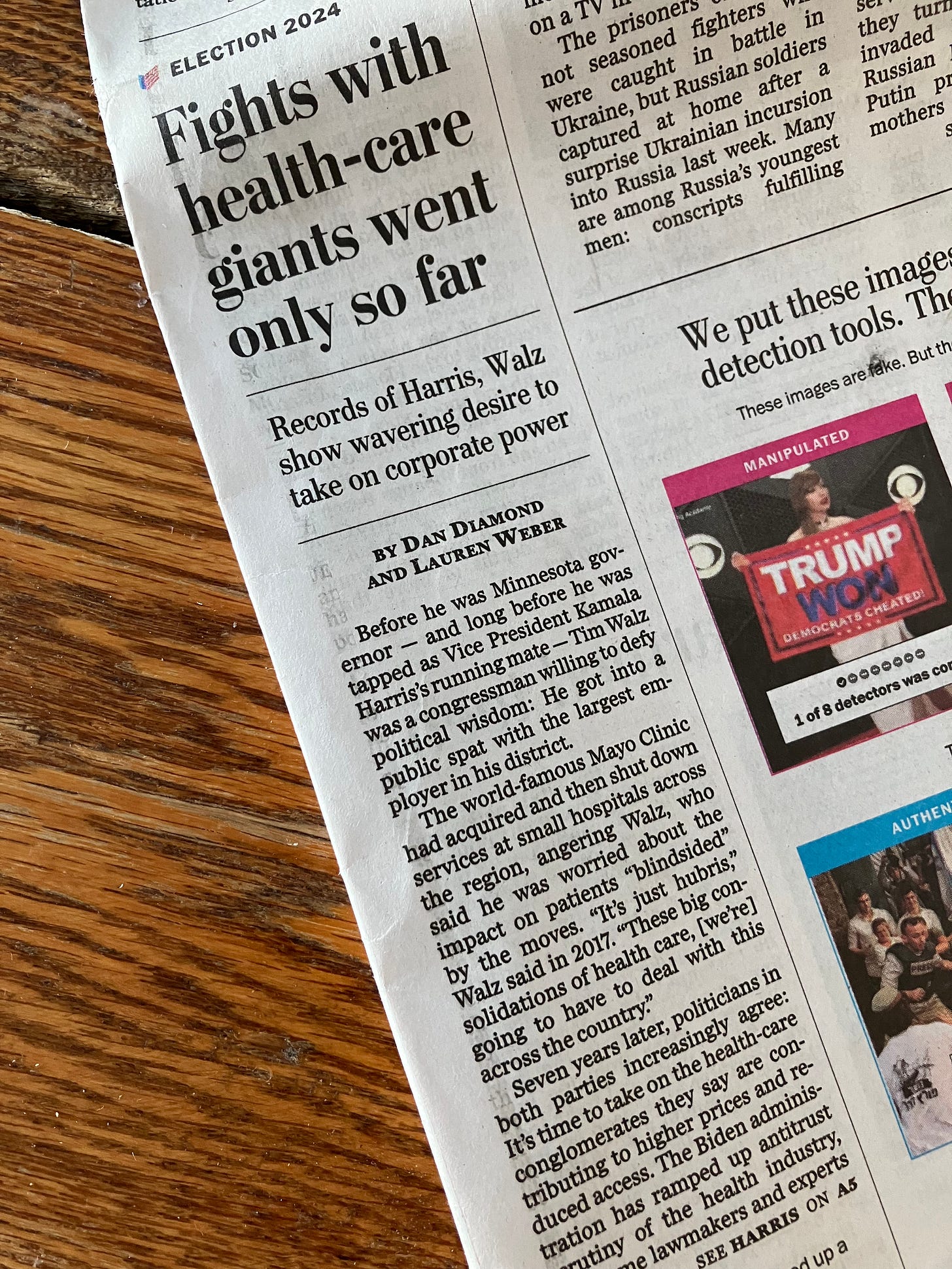What Tim Walz once told me about hospitals' power
Reflecting on the Democrats' VP nominee and his relationship with a health care giant
Seven years ago, I was running through downtown Rochester, Minnesota — one of America’s most charming small cities — when I saw something so surprising, it stopped me in my tracks:
A bunch of protesters outside the Mayo Clinic.
If you haven’t been, Rochester is a company town — and Mayo is the beloved company, a world-renowned health system that draws attention and travelers to the southeastern corner of Minnesota. It’s the biggest employer in the entire state.
It doesn’t usually draw sign-waving protesters outside its front door. Especially in genial Minnesota.
The protesters turned out to be from Albert Lea, a small city about an hour away from Rochester. Years earlier, Albert Lea leaders had willingly handed over control of their local hospital to Mayo, with many residents thrilled that the top-ranked health system would now oversee their care.
But now Mayo was cutting back on hospital services in Albert Lea and relocating them 23 miles away, to another city called Austin.1 Some Albert Lea patients now had to be shuttled all the way to Mayo’s headquarters in Rochester, 64 miles away, to get their care.
Albert Lea residents were feeling betrayed and “blindsided,” as the local congressman told me in Nov. 2017 — a congressman who went by the name of Tim Walz.
And other rural communities that depended on Mayo were alarmed, too, Walz said, as you can hear in this excerpt from our interview.
We chatted for more than 30 minutes in his Capitol Hill office, ahead of a story that I wrote on the growing rural tensions around the Mayo Clinic.2 I remember leaving Walz’s office and reflecting on the fascinating politics: a congressman, willing to criticize the biggest employer in his district and state — no small thing, given that Walz was running for governor.
A year later, Walz would win his governor’s race. About four years after that, he’d get drawn into another conflict with Mayo Clinic — and this time, he was the one blindsiding allies and aligning with the health system.
I’ve been thinking a lot about Walz’s arc as he’s suddenly emerged as a national figure, and America’s potential next vice president. It’s particularly interesting to me because he’s not the only member of the Democratic ticket to scrutinize hospitals’ power; as California attorney general, Kamala Harris investigated hospital consolidation, part of her broader efforts to wrangle with corporate power in health care.
It’s a story that my colleague Lauren Weber and I tried to tell in a front-page article at The Washington Post this weekend: Harris and Walz fought health-care corporate power — to a point.
You can read that story here.
One reason we did the story: to look for clues on how Harris and Walz would address health care corporate power, if elected, and what it could mean for Americans’ health care costs.
Our story also arrived as Harris and Walz rolled out their new economic proposals on Friday, which included Harris’s vow to help cancel many Americans’ medical debt and lower prescription drug costs. My colleagues Jeff Stein and Yasmeen Abutaleb took a look at the Harris’s campaign’s rollout, with an assist from me.
And today, Harris’s economic policies were the top focus of the Sunday morning talk shows. My colleague Fenit Nirappil and I reviewed how Democrats defended the new Harris economic plan, and how Republicans tried to shift focus to Harris’s past record, such as her former support for Medicare for All.
Not on today’s TV docket: the fight over a Minnesota hospital system, and what it revealed. (And given the many issues jockeying for attention right now, it may never come up in this 80-day sprint to Election Day! But I’ll be watching for it.)
This made Mayo’s decision sting that much more: As one prominent person put it to me, the local dynamic between Albert Lea and Austin felt kind of like Springfield vs. Shelbyville in “The Simpsons.”
Mayo had said the system needed to cut back on its services in Albert Lea because the hospital was losing money and the patient base in Albert Lea was too small to justify a full-fledged hospital. Albert Lea residents said they recognized the challenge of providing health care to a rural community, but felt that Mayo was distant from their concerns. The folks in Albert Lea were particularly angry that they’d handed their hospital over so readily — "Mayo did not pay a dime for it,” grumbled one letter-writer to the local newspaper — only to have the health system later wind down its operations.




